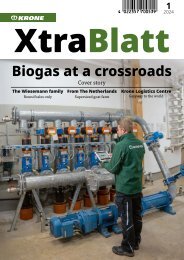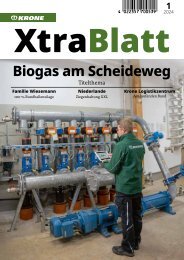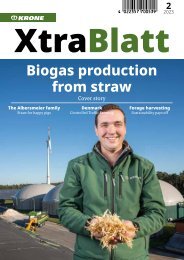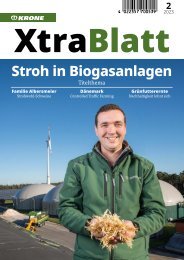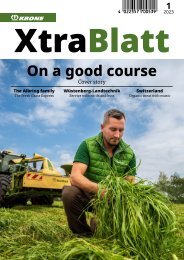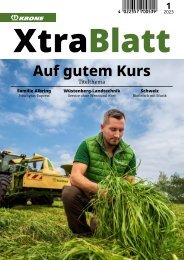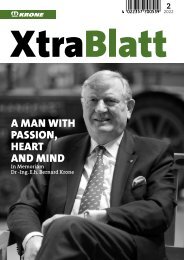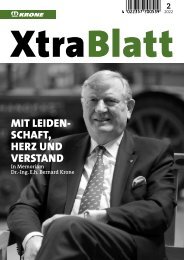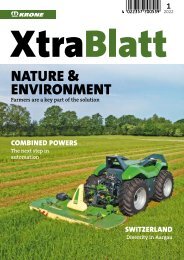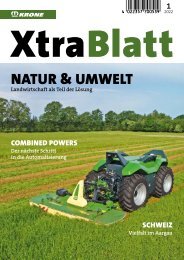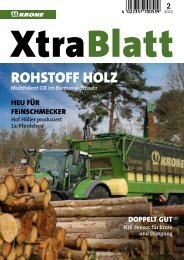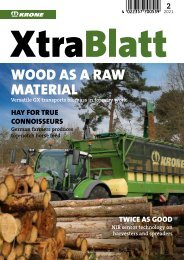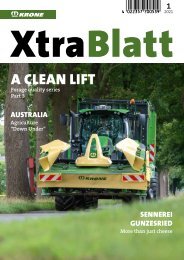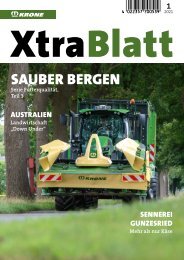XtraBlatt Issue 02-2020
You also want an ePaper? Increase the reach of your titles
YUMPU automatically turns print PDFs into web optimized ePapers that Google loves.
4 5<br />
IMPRINT<br />
Publisher:<br />
Maschinenfabrik<br />
Bernard Krone GmbH & Co. KG<br />
Heinrich-Krone-Straße 10<br />
48480 Spelle<br />
Tel.: +49(0)5977/935-0<br />
info.ldm@krone.de<br />
www.krone.de<br />
Responsible according to Press Law:<br />
Henrik Feldmann<br />
Editorial staff:<br />
Beckmann Verlag GmbH & Co. KG<br />
Rudolf-Petzold-Ring 9<br />
31275 Lehrte<br />
www.beckmann-verlag.de<br />
Layout:<br />
Beckmann Verlag GmbH & Co. KG<br />
Rudolf-Petzold-Ring 9<br />
31275 Lehrte<br />
www.beckmann-verlag.de<br />
Print:<br />
Bonifatius Druckerei<br />
Karl-Schurz-Straße 26<br />
33100 Paderborn<br />
Photographic material:<br />
Unless specified differently:<br />
Maschinenfabrik<br />
Bernard Krone GmbH & Co. KG<br />
and editorial staff respectivelyS. 6–9:<br />
Metzgerei Ammon<br />
S. 24–25: arturdidyk/Depositphotos.com<br />
S. 28–31: Feuerborn/agrarheute<br />
S. 34–37: Kneer (3)<br />
S. 46–49: Meusel (4)<br />
S. 51: Graphic: LandBauTechnik-Bundesverband<br />
S. 60: Graphic: vska/Depositphotos.com<br />
Print run:<br />
38,000 copies<br />
<strong>XtraBlatt</strong> appears biannually for Krone<br />
customers in Germany, Austria and<br />
Switzerland. Reprints only allowed with<br />
permission of publisher. This also applies<br />
to copying into electronic databanks and<br />
reproduction on CD-ROM.<br />
If you no longer wish to receive e-mails<br />
from us after receiving the Krone<br />
<strong>XtraBlatt</strong>, please let us know by e-mail<br />
info.ldm@krone.de. We will immediately<br />
take you off the distribution list. All data<br />
we receive from you is treated confidentially.<br />
It is only used for processing<br />
your requests and feedback. We do not<br />
communicate any data to third parties<br />
CONTENTS<br />
CONTENTS<br />
5<br />
3 Editorial<br />
Editorial<br />
6 Metzgerschlachthof Fürth: Regional from conviction<br />
Metzgerschlachthof Fürth: Regional from conviction<br />
10<br />
10 Biohof Kinkelbur: Ice and eggs sell well<br />
Biohof Kinkelbur: Ice and eggs sell well<br />
14<br />
14 Quality forage harvesting series: Ease off speed<br />
Quality forage harvesting series: Ease off speed<br />
20<br />
20 Pasture pigs: Swine in the open air<br />
Pasture pigs: Swine in the open air<br />
24<br />
24 Maschinenfabrik Bernard Krone: Sailing on<br />
Maschinenfabrik Bernard Krone: Sailing on<br />
28<br />
28 Farm contractor Will Murphy (GB): Big business big bales<br />
Farm contractor Will Murphy (GB): Big business big bales<br />
32<br />
32 Behind the scenes<br />
Behind the scenes<br />
34<br />
34 Kneer family: Real professionals<br />
Kneer family: Real professionals<br />
38<br />
38 News-Ticker<br />
News-Ticker<br />
40<br />
40 Agrimec/Abemec (NL): The specialists<br />
Agrimec/Abemec (NL): The specialists<br />
43<br />
43 Krone museum: “Now it’s really good.”<br />
Krone museum: “Now it’s really good.”<br />
46<br />
46 Hay Heinrich: Farming – conservation – adding value<br />
Hay Heinrich: Farming – conservation – adding value<br />
50<br />
50 LandBauTechnik-Bundesverband: Performance providers<br />
LandBauTechnik-Bundesverband: Performance providers<br />
54<br />
54 GreenNight-Tour: Meadow movies<br />
GreenNight-Tour: Meadow movies<br />
56<br />
56 Dortmund Parks Department: Nature-near city parkland<br />
Dortmund Parks Department: Nature-near city parkland<br />
59<br />
59 EU Education Ministers: A look into learning<br />
EU Education Ministers: A look into learning<br />
60<br />
60 Future Lab: Testing heart and soul<br />
Future Lab: Testing heart and soul<br />
14<br />
INFORM<br />
QUALITY FORAGE HARVESTING SERIES – PART 2<br />
TEDDING AND SWATHING<br />
FOR BETTER FEED<br />
EASE OFF SPEED<br />
15<br />
QUALITY FORAGE HARVESTING SERIES – PART 2<br />
TEDDING AND SWATHING<br />
Those seeking good results in tedding and swathing<br />
should tend towards slower operation speeds. And<br />
if higher work rates are wanted, go for bigger machines<br />
with more working width.<br />
FOR BETTER FEED<br />
EASE OFF SPEED<br />
FARM CONTRACTOR WILL MURPHY, GREAT BRITAIN<br />
BIG BUSINESS<br />
BIG BALES<br />
Will Murphy runs a classic new business up in the county of<br />
Suffolk, Great Britain. His concept is baling straw with two<br />
Krone HDP machines packing a good 30,000 bales per season.<br />
A great reason for a visit from Bernd Feuerborn, journalist with<br />
agrarheute magazine.<br />
The business base is hard to find, nestling somewhere<br />
way out in the British countryside. Narrow lanes lead<br />
to the farm – fields as far as the eye can see. In the yard<br />
stands a corrugated iron barn with an office container<br />
settled in front. Alongside the barn await two Krone large<br />
square balers, ready for action. One, a BiG Pack 1290 HDP<br />
High Speed and the other a BiG Pack HDP II. The HDP High<br />
Speed was a season old, the HDP almost new, when we<br />
visited contractor WRM Agri Ltd in summer.<br />
Will Murphy founded his contractor firm in 2016 as 27-yearold<br />
seeking the independence of self-employment. Beforehand,<br />
he’d worked a couple of years in the straw trade for a<br />
firm that bought straw as power station fuel. In the electricity<br />
plant straw was mixed with wood chips before firing the<br />
boilers to produce 44 MW, enough for 82,000 households.<br />
Each year, 240,000 t straw were needed for this purpose,<br />
with the plant now in its fourth year of full operation. This<br />
is where Will saw his chance as a self-employed supplier of<br />
straw. In fact, there are four such biomass electricity works<br />
in the region with a total straw requirement of 1 m t.<br />
28<br />
INTERNATIONAL<br />
season’s business should go. The most important machines<br />
in this respect are the balers, a reason why the Krone balers<br />
are new or almost new.<br />
The only bale size he wanted was 120 x 90 cm and he likes<br />
density as high as possible, which in turn minimises straw<br />
transport costs. This is why the 1290 HDP High Speed joined<br />
the fleet in 2018. With this machine the contractor takes a<br />
further precautionary step and has the baler serviced by<br />
the local Krone dealership and has bought an extended<br />
guarantee for the machine. “The capacity for enormous<br />
straw density in the bales, but also the good service supplied<br />
by the Krone dealership, were decisive factors for my purchase”,<br />
says Will Murphy. The baler is powered by a Massey<br />
Ferguson (MF 8670) 2012 model with 3,300 hours on the<br />
clock. “With the tractors I’m always on the lookout for good<br />
used machines, older but with low hours.” With its 320 HP,<br />
the present MF has the required power for the HDP baler.<br />
Things were different in the beginning with a Xenon 3800,<br />
already 12 years old, running in front of the HDP II. It came<br />
into the business with 2,500 h. This baler needs more than<br />
380 HP on-hand in order to achieve full output, reckons Will<br />
Murphy. For this reason, he’s added another 40 HP with chip<br />
tuning. It seems there’s no problem in this respect with the<br />
road authorities in Britain or road vehicle insurance.<br />
Both tractors are fitted up-front with Agriweld swath rollers.<br />
In this region the combines are working with 6 to 12 m<br />
cutterbars and with the roll pressure on the big swaths, it’s<br />
reckoned that the baler can work at up to 4 km/h faster. We<br />
would have liked to have seen this proved in action.<br />
Will Murphy started off small scale. He asked the manager of<br />
a 2,400 ha farm if he could buy and bale 80 ha straw. Because<br />
the manager was at the time not so happy with his present<br />
contractor, he ended up being offered 400 ha for baling.<br />
He grabbed the opportunity and impressed everyone with<br />
prompt service and clean baling work. Nowadays, he bales<br />
straw on the whole farm and has secured baling contracts<br />
for a further 1,600 ha in the region.<br />
The business with the straw is quite a simple one in this area.<br />
The farmers sell their straw from the field to the contractor.<br />
Thereby barley, wheat and – amazingly – rapeseed straw are<br />
all baled. As soon as the combine is finished, Will enters the<br />
field with his baling team. Because he’s expected to clear<br />
the stubble quickly, work capacity is important. After all, the<br />
complete risk lies with the contractor. Payment is by weight.<br />
All bales are recorded and traceable to field of origin. The<br />
contractor gets his cash on delivery of straw to the power<br />
station storage barns. Here, every bale is weighed.<br />
TWO HDP BALERS<br />
Three years into the business, Will Murphy’s labour force<br />
had reached six seasonal workers employed for up to 10<br />
weeks from July to September. However, the main work<br />
is completed – weather and harvest permitting – usually<br />
within six weeks. The contractor has a clear vision of how the<br />
The two Krone balers run by<br />
Will Murphy together manage<br />
to produce up to 30,000 bales<br />
per season.<br />
29<br />
40<br />
PARTNER<br />
GRÜNLAND-MANAGEMENT: NIEDERLANDE<br />
NUR QUALITÄT<br />
Leading machinery makes in the product<br />
range and benchmark status in service have<br />
helped the Abemec Group establish a powerful<br />
presence in the southern half of the<br />
Netherlands. Interesting thereby: sales and<br />
service facilities now exist as separate subsidiaries.<br />
The aim is clear: “Optimally, none of<br />
our customers should have to drive<br />
further than 30 km (18 miles) to reach one<br />
of our sales or service locations”, emphasises<br />
Hans Quint. He’s managing director<br />
of Abemec b.v. which has its head office in<br />
Veghel, around 25 km north of Eindhoven<br />
and therefore in the heart of Noord-Brabant,<br />
one of the Netherlands’ three southernmost<br />
provinces. But the operative area of this<br />
company specialising in sales and service of<br />
farm machinery stretches far further afield.<br />
14 of the now existing 21 branch depots<br />
run by this 70-year-old organisation lie in<br />
the “home ground” of Noord-Brabant and<br />
Zeeland. As part of a carefully planned expansion<br />
strategy, a further seven locations<br />
have been added in the centre and north<br />
of the country.<br />
NEW STRUCTURE<br />
But why did Abemec open, in February 2<strong>02</strong>0,<br />
a further, completely new-built, facility<br />
in 10,000-soul Beek en Donk, just 12 km<br />
from Veghel? After all, purely from business<br />
logic this close positioning of specialised<br />
facilities makes little sense. In this case,<br />
though, there’s a logical explanation, says<br />
Hans Quint. Between 2014 and 2019, the<br />
Munich-based agricultural supplier BayWa<br />
AG gradually took over Abemec.<br />
This led to the challenge of retaining the<br />
Fendt exclusive sales strategy, as carried out<br />
by the business for the preceding 55 years<br />
in Veghel. “The concept we’d so far successfully<br />
followed, as far as our customers were<br />
concerned, involved always listing strong<br />
brands from specialised manufacturers in<br />
the individual product sectors”, explains<br />
Hans Quint. “We had worked with most<br />
of these firms for decades. For example,<br />
with Krone since 1995. To relinquish this<br />
policy would have set us back enormously<br />
in the market. So we made up our minds to<br />
continue this strategy, and to unite it with<br />
that of our new owner for best possible<br />
synergy effect.”<br />
This has resulted since 2019 in a trio of<br />
self-contained companies under the roof<br />
of a single holding: Agrimec. One of the<br />
daughters, Agromec, focusses exclusively<br />
on customer-advice and sales for the complete<br />
Fendt range. Abemec Machines, on<br />
the other hand, is responsible for sales of<br />
the other core brands – except for tractors.<br />
And the third part of the trio is responsible<br />
only for technical customer services, as<br />
emphasised by the company name Abemec<br />
Service. The highlight here is that the<br />
service division supports all products from<br />
both sales companies. And so the question<br />
on locational nearness of the Veghel and<br />
Beek en Donk facilities is explained. “In<br />
Veghel, we concentrate on Fendt sales and<br />
presentation of new Fendt machinery. In<br />
Beek en Donk, the head office of Abemec<br />
Machines, our interest is centred on Krone,<br />
Dewulf, Agrifac and other specialists”,<br />
explains the managing director.<br />
Separate sales structures will continue<br />
to exist for individual main makes. But<br />
servicing in Abemec’s 21 locations will be<br />
carried out in the same way for all makes.<br />
AGRIMEC/ABEMEC<br />
THE<br />
SPECIALISTS<br />
41<br />
50<br />
INTERVIEW<br />
Farm machinery dealerships represent<br />
the key interface between<br />
manufacturer and end customers.<br />
Why interactions at this point are<br />
not always stress-free, and what<br />
solutions to improve the situation<br />
might look like, is discussed here<br />
in an interview with Ulf Kopplin,<br />
president of the LandBauTechnik-<br />
Bundesverband (National<br />
Agricultural Machinery and<br />
Equipment Dealers and<br />
Repairers Association).<br />
51<br />
LANDBAUTECHNIKBUNDESVERBAND<br />
PERFORMANCE<br />
PROVIDERS<br />
<strong>XtraBlatt</strong>: Herr Kopplin, machinery which has become<br />
increasingly complex over the years ensures that the importance<br />
of the supplying, servicing and repairing dealership<br />
increases. Isn’t this development actually a very welcome<br />
one?<br />
Ulf Kopplin: You’re correct in the assumption that highly<br />
qualified personnel are needed more than ever in dealership<br />
workshops to ensure reliable servicing of machinery that can<br />
include the very latest technological developments. This gives<br />
our member companies a central and growing importance in<br />
the relationship between manufacturers and end customers.<br />
However, there are definitely no grounds here for unrestrained<br />
jubilation. The investment needed to support this level of<br />
performance, and to encourage further the appropriate<br />
technical development, is gigantic. For instance, the cost<br />
item ‘vocational education and training’ alone represents<br />
tens of thousands of euros each year for every dealership,<br />
even when simply considering calculated training costs and<br />
related downtime through the days when the trainees are<br />
not at their workplaces. On top of this comes the required<br />
workshop equipment, joining another cost block that’s just as<br />
serious: the area of guarantee costs. All this is hardly possible<br />
any longer at the rates commonly charged. The dealerships<br />
are the performance providers of the branch. Their input must<br />
be justly rewarded!<br />
<strong>XtraBlatt</strong>: Aren’t you complaining here from an already<br />
excellent position? After all, standard rates of 90 €/h for<br />
a skilled mechanic with a master certificate, or 65 €/h for<br />
one who has completed all basic training, cannot be called<br />
chickenfeed - at least from the point of view of the bill-paying<br />
customer. And not every dealership workshop provides<br />
highest standards in work quality and performance.<br />
Kopplin: As far as hourly rates are concerned, those charged<br />
by our farm machinery dealerships remain well below those<br />
of other technical sectors, e.g. for road going vehicles, or IT.<br />
And do not forget that the standard of knowledge and qualifications<br />
represented in a farm and construction machinery<br />
mechatronics engineer compared with colleagues in the<br />
other areas just mentioned is – in all modesty - substantially<br />
greater. I am absolutely convinced of that. In practice, there<br />
may well be differences in quality. But the future-oriented<br />
companies are all in a very good position in this context.<br />
And what I do not like is the current tendency, at least in<br />
some customer circles, to expect us as service providers to<br />
consider reducing our bills. What we charge now represents<br />
income that’s crucial for our businesses. That the economic<br />
situation in farming and therefore in agricultural contracting<br />
too, may be unfavourable is not an acceptable reason. Just<br />
think about it: Would you make a similar demand of your<br />
In particular, the<br />
so-called internal<br />
workshop hours<br />
drive costs upwards<br />
substantially for many<br />
dealerships.<br />
Distribution of workshop hours 2019<br />
Paid-for time in workshops<br />
in agricultural machinery dealerships 2019<br />
Internal time in workshops<br />
in agricultural machinery dealerships 2019<br />
Absent<br />
24.0%<br />
External<br />
hours 36.9%<br />
Internal<br />
hours 33.8%<br />
Assistance<br />
hours 5.3%<br />
New machinery<br />
28.5%<br />
Used<br />
machinery<br />
10.9%<br />
Guarantee/<br />
goodwill 23.3%<br />
Depot/delivery/<br />
demonstrations<br />
etc 14.9%<br />
Rest<br />
22.4%<br />
60<br />
INFORM<br />
FUTURE LAB<br />
TESTING<br />
HEART AND<br />
SOUL<br />
The more thorough the testing of<br />
material and machinery, the better the<br />
outlook for subsequent breakdownfree<br />
customer operation. With this in mind, Krone opens<br />
a new chapter in quality assurance with its “Future Lab”.<br />
61<br />
start such a test laboratory valued at over 20 m €. And to get<br />
it working with a team and the very latest test technology,<br />
representing a once-in-a- lifetime chance in a professional<br />
career. “On top of this, the Krone Group puts its complete<br />
know-how into the validation from both its divisions:<br />
commercial vehicles and agricultural machinery. This produces<br />
very many synergy effects, boosting our work results<br />
enormously. A situation not to be found anywhere else in<br />
the manufacturing landscape”, he states with noticeable<br />
enthusiasm.<br />
SIMULATING STRESS<br />
And how or, indeed, what is to be tested in each case? There’s<br />
an enormous variety of possible subjects. Too long to list<br />
here, says Jürgen Graumann. But he mentions a couple of<br />
the available facilities such as often very large test stands.<br />
There’s also a test track and an outdoor area for trials. The<br />
main work includes functional and long-term load tests<br />
with the aim of literally discovering the limits of what is<br />
possible with the material involved. Such tests take place<br />
under an enormous number of simulated scenarios. “Krone<br />
products must function reliably and continually under all<br />
climatic conditions and weather zones around the globe. So<br />
we test, among other things, electronic modules in a climate<br />
chamber to ensure that influences such as temperature or<br />
moisture content levels do not impact functionality”, he<br />
explains.<br />
As a further highlight, he names the road simulator, called<br />
X-Poster in specialist speak. With this, among other things,<br />
working life cycles of the drive train and<br />
bodywork of truck trailers are reproduced.<br />
The aim here is to simulate one million km<br />
roadwork within a three-week trial - over<br />
as many different types of road surface as<br />
possible. “The collected data allows realistic<br />
usage results to be fed into a computer<br />
model for reliable information on lifetime<br />
stress. The development steps, up to prototypes<br />
and the later test phases of the<br />
machinery, can in this way be substantially<br />
more effective. This helps efficiency, because<br />
prototype construction and the further steps up until<br />
readiness for serial production are extremely cost intensive.<br />
“Thus, the better we carry out our work in the Future Lab,<br />
the less teething troubles to take care of later. Or, to stay in<br />
health simile mode: prevention is better than cure. What<br />
we have tested heart and soul is therefore very fit for the<br />
future.” «<br />
The best machinery manufacturers have always tried<br />
to put their money on safeguarding respective reputations<br />
for tractor and implement reliability. And increasingly,<br />
as machinery becomes more sophisticated and complex, as<br />
the pressures to get a quality crop in are ever-greater in line<br />
with larger farms, bigger herds and the demand for optimal<br />
crop quality, downtime for expensive equipment out in<br />
the field is a very expensive experience. So the pressure<br />
continues to test every idea, design and material involved<br />
the best way possible. Particularly in vehicle technology, the<br />
effort invested in such testing is enormous - for example<br />
by Krone.<br />
“After all, our products represent investments of substantial<br />
value, that in practice are subject to considerable wear<br />
and tear. The more comprehensively testing is carried out<br />
during even first development steps on the computer and<br />
then right through to the final inspection before customer<br />
delivery of a completed machine, the better its resultant<br />
assurance and operational quality. In other words, value<br />
retention for the customer remains acceptable”, explains<br />
Jürgen Graumann. He’s manager of the “Future Lab” created<br />
by Krone in 2019, although in official Krone formulation, it’s<br />
called the “Validation Centre”.<br />
BUNDLED KNOW-HOW<br />
The term validation indicates the focal point of the operations<br />
taking place in the Future Lab, located at Lingen in<br />
German Emsland. “Our task is, above all, to utilise complex<br />
modern measurement and testing technology, as well as<br />
appropriate analysis procedures, to test the<br />
functionality and robustness of components,<br />
component groups and complete vehicles and<br />
machinery. The data and information thus<br />
collected flow finally as basic information into<br />
product development and the production process”,<br />
explains Jürgen Graumann. “This has,<br />
however, little to do with the quality control<br />
carried out by our colleagues, for instance<br />
on goods coming into the factory or during<br />
checks at the end of the assembly line before<br />
delivery. The knowledge collected by our work<br />
is applied much earlier. One can say the information we<br />
secure ensures the constructive success of future products<br />
– so that the name Future Lab fits very well.”<br />
This materials engineer is fascinated, not only by the daily<br />
work in the lab - which alone is enthralling enough, he<br />
reckons. But mainly by the opportunity to plan from the<br />
“KRONE PRODUCTS<br />
MUST FUNCTION<br />
RELIABLY AND<br />
CONTINUALLY<br />
UNDER ALL CLIMATIC<br />
CONDITIONS.”<br />
JÜRGEN GRAUMANN,<br />
FUTURE LAB MANAGER<br />
54<br />
INFORM<br />
THE GREENNIGHTTOUR<br />
MEADOW<br />
MOVIES<br />
This year, the corona crisis stopped the<br />
famous Krone Grassland Evenings. This<br />
left us with the question: How can we still<br />
manage to combine information on our<br />
latest machinery with personal distancing<br />
and not forgetting the traditional<br />
conviviality? The Krone management<br />
team’s answer: Tractor cinema on 14<br />
locations throughout Germany.<br />
White nights, blue hours...Summer<br />
offers many magical moments.<br />
This year, green nights joined the spectrum.<br />
More precisely: the GreenNight-Tour from<br />
Krone. Behind this lay a Germany-wide<br />
series of tractor cinema events staged on<br />
grassland over a period of almost three<br />
weeks. “The idea came to us as the development<br />
of the corona pandemic encouraged<br />
a renaissance of traditional drive-in movies<br />
in many places, a cinematic experience<br />
permitting distancing and hygiene rules.<br />
This could also function with tractors, we<br />
thought”, relates Ingo Schoppe from the<br />
Krone marketing team.<br />
MOBILE CINEMA<br />
Conceived, achieved: a total 14 such events<br />
were planned between 18th June and 12th<br />
July, with venues right across the republic<br />
between Wurster near Cuxhaven on the<br />
North Sea coast and Dentingen, southwest<br />
55<br />
of Ulm. At each event there was strong<br />
support from the respective regional Krone<br />
dealerships. “This was a great help for us<br />
because an awful lot of work was involved.<br />
After all, it wasn’t just that invitations were<br />
to be sent off to customers from the region<br />
and available areas of grassland found and<br />
booked for the cinema evening with room<br />
for a large number of tractors. Among the<br />
most imposing challenges were the safety<br />
and hygiene aspects, as well as securing<br />
permission from the local authorities. In<br />
fact, though, everyone involved worked<br />
together superbly with us”, he smiles.<br />
On-site, procedure was always the same. In<br />
the forenoon the GreenNight team arrived<br />
with sack and pack to get the site ready.<br />
Stand areas were measured and parking<br />
spaces marked out with lawn mowers,<br />
boundary tapes were staked out and an<br />
entry control hut positioned, the 18 x 9 m<br />
screen was inflated, film and audio equipment<br />
assembled – just some of the many<br />
jobs necessary before all was set to go. And<br />
although the procedure became almost<br />
routine after the first event, every date and<br />
location needed small extra adjustments.<br />
Evenings just before 8.30 the first guests<br />
rolled in with their tractors. Mostly, it took<br />
an hour before everyone had arrived and<br />
the machines lined up in neat rows. Clear<br />
instructions were given on what everyone<br />
had to watch out for. “For us, the obeying<br />
of hygiene and distancing regulations was<br />
obviously very important, and instructions<br />
were handed out to every participant on<br />
arrival because in this respect we could<br />
afford no compromise”, emphasises Ingo<br />
Schoppe.<br />
PLENTY APPLAUSE<br />
Our marketing team member found the<br />
resonance from customers impressive. On<br />
average, between 120 and 150 vehicles<br />
found themselves on each grassland site,<br />
up to 95% being tractors. A few cars also<br />
turned up and they were naturally let in too,<br />
so that their occupants could also follow<br />
the exciting programme. Included in the<br />
introduction was “Performance-Bingo”<br />
a very competitive game devised by the<br />
marketing team. This featured contestants<br />
drawing numbers and then having to rush<br />
over to a bingo board at the entrance and<br />
hook up on the matching number there.<br />
Part of the excitement was the lighting up<br />
of the screen as sunset approached. First,<br />
came a number of “action films” featuring<br />
the latest Krone machinery at work. The<br />
main attraction without a doubt, however,<br />
was the film “Farm mechanisation worldwide”<br />
produced in cooperation with “profi”<br />
magazine and “landtechnikvideos”. At the<br />
end there was plenty applause, contented<br />
faces and, during the exit of the visitors in<br />
their tractors, an absolutely sensational<br />
light show staged by the tractors. “One<br />
thing was always clear to us as each evening<br />
event finished”, concludes Ingo Schoppe.<br />
“Our guests were delighted to experience<br />
an open-air event again, after weeks and<br />
months of the corona limitations.” «<br />
Ingo Schoppe: very<br />
happy about the<br />
great success of the<br />
GreenNight-Tour<br />
2<strong>02</strong>0.<br />
10<br />
TITLE THEME<br />
BIOHOF KINKELBUR<br />
ICE AND EGGS<br />
SELL WELL<br />
Milk, ices, eggs, potatoes – and beef too. These are the<br />
main products sold in the Kinkelbur family’s farm shop.<br />
The Kinkelburs have been dedicated to organic production<br />
for almost 40 years now, and have a farm business<br />
to be proud of.<br />
The Kinkelbur organic farm started<br />
direct marketing in spring 2<strong>02</strong>0 with the<br />
establishment of its first “henmobile”.<br />
A crowing cockerel on a dung heap surrounded by deep,<br />
muddy puddles? Perhaps partly due to old-fashioned<br />
images in children’s books this, or something like it, is what<br />
springs to mind for many as the typical organic farmyard.<br />
But does “bio” farming really have to look like this? Not at<br />
all!<br />
Quite the opposite, in fact, is to be seen on the Kinkelbur<br />
family’s Bioland farm at Minden-Haddenhausen in the<br />
German state of North Rhine-Westphalia. A large herd of<br />
black and white dairy cows loose housed in a cubicle barn,<br />
and 350 laying hens in mobile accommodation (the “henmobile”)<br />
are all kept in a neat and tidy farm business that’s<br />
grown steadily over the years. It’s beautiful there. In fact,<br />
very beautiful! Nestling idyllically under the Kaiser Wilhelm<br />
Memorial at Porta Westfalica near Schloss Haddenhausen,<br />
the Kinkelbur farm attracts crowds of customers to its<br />
seven-days-a-week farm shop.<br />
On our visit, we joined a busy throng in the yard. Farm<br />
workers, potato buyers, shoppers with questions to ask,<br />
a vet and someone delivering animal feed. All vied for<br />
attention – and always in the centre of the turmoil, farmer<br />
Friedrich Kinkelbur, energetically helping and organising.<br />
The 51-year-old is organic farmer through and through.<br />
He’s convinced that the bio way is the right way. His father<br />
changed to organic management as early as 1981, so that<br />
much of the land has been organically farmed for almost 40<br />
years now, with not a single drop of plant protection spray<br />
or spot of mineral N fertiliser applied in that time. The farm<br />
has grown steadily. Fields are continually added, there’s been<br />
renovation and rebuilding. A neighbouring farm has been<br />
rented and this is where the herd followers are kept. “When<br />
a farm expands, new colleagues are needed that can think<br />
for themselves, work well and be self-reliant, ever ready to<br />
inject their ideas into the business. And this is the kind of<br />
staff we have”, emphasises the farmer.<br />
FARM-MADE ICE CREAMS<br />
The farm shop has been open since spring 2<strong>02</strong>0. Available<br />
there are home-grown potatoes as well as eggs, milk and<br />
beef. Friedrich Kinkelbur explains that regionality is a major<br />
aim with the food he sells. “Our cattle are slaughtered<br />
nearby by a family firm.” There, the carcasses are jointed<br />
by skilled butchers. The proportion of saleable cuts per<br />
carcass is high. Each customer can order a box. And the<br />
box is delivered with everything that’s available: filet and<br />
roastbeef, roasting cuts, ready-cut beef casserole slices, soup<br />
meat, ossobuco, bones, goulash and mince.<br />
<strong>XtraBlatt</strong>: We already reported in <strong>XtraBlatt</strong> issue 1-2<strong>02</strong>0<br />
the precautionary measures undertaken by Krone in spring<br />
to combat the effects of the corona virus. How should we<br />
summarise the results of all efforts following nearly nine<br />
months in pandemic mode?<br />
Martin Eying: As far as company-internal measures are<br />
concerned, we can be very positive. Certainly, such measures<br />
sometimes entailed enormous changes for all employees.<br />
Reorganisation of all processes was also a huge undertaking,<br />
but one that was carried out with great commitment and<br />
energy by everyone concerned. An example is the way in<br />
MASCHINENFABRIK BERNARD KRONE<br />
SAILING ON<br />
The Krone farm machinery division thankfully<br />
sailed free and fair through the corona<br />
squalls of 2<strong>02</strong>0. But what lessons were<br />
learnt from this period? And what<br />
might the long-term consequences<br />
be? <strong>XtraBlatt</strong> discusses some<br />
results of the crisis with Martin<br />
Eying, managing director sales/<br />
marketing, and marketing<br />
manager Henrik Feldmann.<br />
24<br />
INTERVIEW<br />
which our IT department established at such short notice<br />
the necessary technology for home office work wherever required.<br />
Many other departments mastered similar challenges.<br />
Today, we can recognise that the limitations and regulations<br />
imposed by the situation, although not always easy, have<br />
become part of normality. All, and this means every single<br />
person involved in our complete team, have excelled in terms<br />
of responsibility and commitment during this time, and for<br />
this deserve heartfelt appreciation!<br />
Henrik Feldmann: Our internal pandemic working group not<br />
only succeeded in developing the initial protection concepts<br />
and then applying the measures decided upon; the group<br />
also continually optimised and redirected the measures. For<br />
instance, in summer at the end of the holiday season. The<br />
result is that, since March, we’ve maintained continuous<br />
production and deliveries without quarantine restrictions<br />
and any significant downtime losses. We’ve been able<br />
to fulfil completely the orders of our customers, and<br />
this makes us very happy indeed!<br />
<strong>XtraBlatt</strong>: And the delivery chains of suppliers?<br />
Weren’t these interrupted?<br />
Eying: Naturally there were shortterm<br />
disruptions initially, but no<br />
definite stoppages. Through<br />
a number of our European<br />
suppliers being quickly<br />
registered in spring as<br />
system relevant, overall production continued smoothly with<br />
no significant bottlenecks.<br />
<strong>XtraBlatt</strong>: In other words, a good basis for a satisfactory<br />
gross turnover in the farm machinery division of 732 million<br />
€ and 4.8% growth.....<br />
Feldmann: Please don’t forget, though, that our business year<br />
begins 1st August and ends 31st July. In other words, into<br />
the 2019/2<strong>02</strong>0 results have flowed the earnings from seven<br />
months without corona. Still, by the time the pandemic was<br />
underway in spring, we didn’t dare hope for the respectable<br />
results we in fact achieved by July although, as mentioned,<br />
we did after all fulfilled all our orders.<br />
Eying: Naturally, demand developed very differently in<br />
individual markets. But on the whole, it was acceptable in<br />
all countries: not only in terms of gross turnover but still<br />
more concerning market share. Our estimates indicate an<br />
additional 1% for all our machinery categories worldwide.<br />
Looking back though, we can see this is typical. Especially in<br />
so-called crisis years, Krone has always profited above the<br />
average reported by competition.<br />
<strong>XtraBlatt</strong>: Why is this?<br />
Eying: The reasons are to be found in the core values of the<br />
family and the Krone company. For generations, these entail<br />
absolute orientation on customers and service, on flexibility<br />
as well as intensive personal contact with practicing farmers<br />
and the markets. Nowadays, of course, the steady growth of<br />
the company means this concept has other characteristics<br />
than those of 20 or even 40 years ago. But the basic principle<br />
remains. And it’s clear that customers really appreciate such<br />
values, especially during difficult years.<br />
<strong>XtraBlatt</strong>: But this personal “connection” to customers is<br />
increasingly difficult under corona conditions.....<br />
Feldmann: That’s true. But it’s still possible. Certainly, what<br />
we’ve had to accept from the pandemic situation is that, in<br />
the near future anyway, large-scale trade fairs will not be<br />
25<br />
34<br />
ON-FARM<br />
KNEER FAMILY, BAD DITZENBACH, GERMANY<br />
REAL PROFESSIONALS<br />
35<br />
KNEER FAMILY, BAD DITZENBACH, GERMANY<br />
REAL PROFESSIONALS<br />
Some words are often misunderstood.<br />
The word “amateur”, for instance. In the<br />
correct sense, an amateur is someone who<br />
does something for the love of it. This is<br />
an entirely fitting term for brothers Moritz<br />
and Florian Kneer. But they easily earn the<br />
title of farming professionals too ... even<br />
although their main business is building<br />
windows.<br />
Oberberghof is a well-kept horse farm<br />
on the outskirts of Bad Ditzenbach,<br />
nestling amid the Swabian Alb foothills.<br />
Enthusiasts of rural architecture would<br />
recognise right away some of the farm<br />
buildings originally fulfilled another purpose.<br />
This is confirmed by Florian Kneer<br />
who runs the farm with brother Moritz.<br />
“From our mother’s side we come from a<br />
family which, as was earlier quite common,<br />
ran a hostelry and butcher’s business along<br />
with the farm. By 1962, our grandfather had<br />
established a beef herd as main enterprise<br />
on Oberberghof. Later, horses were brought<br />
into the business and, after his successful<br />
graduation in horse husbandry at the<br />
Baden-Württemberg State Stud Farm in<br />
Marbach, he specialised completely in this.”<br />
Florian and Moritz took over in 2004, with<br />
Florian manager of the non-agricultural<br />
side and Moritz the person usually found<br />
around the farm.<br />
“We farm around 75 ha here”, explains<br />
Moritz Kneer. “Most is pasture, mainly on<br />
steep slopes. We only have about a hectare<br />
of arable land, along with some woodland.<br />
We have 25 horseboxes with 16 of these<br />
rented out to private horse owners. Riding<br />
is a hobby for most of our customers and<br />
the same applies to us. We’re open minded<br />
about breeds. We keep mainly warmbloods.<br />
A rare breed is represented here by<br />
our Altwürttemberg horse. Additionally,<br />
Florian (l) and Moritz Kneer together manage Oberberghof farm in Bad Ditzenbach.<br />
HAY HEINRICH<br />
FARMING – CONSERVATION –<br />
ADDING VALUE<br />
It’s generally accepted that the content<br />
in small packages is often substantially<br />
dearer than that in larger containers.<br />
This applies to hay too. By text deadline<br />
for this issue of <strong>XtraBlatt</strong>, first-cut hay in<br />
large square bales averaged just under<br />
160 €/t. On his website, “Hay Heinrich”<br />
sells his organic mountain meadow<br />
hay for 1.50 to 3.00 €. Per kilogramme!<br />
Safe to say, this represents a more than<br />
respectable margin. But the business isn’t<br />
as straightforward as it seems. Until the<br />
hay lies ready for sale in the shop shelves,<br />
a lot of work has to be done. And a fair<br />
portion of know-how is needed, too.<br />
ECONOMIC<br />
CONCEPT<br />
Heinrich Meusel doesn’t come from a<br />
farming background. His grandfather was<br />
botany professor and while his father is, in<br />
fact, an agricultural engineer, his main activity<br />
for a long time has revolved around<br />
landscape conservation, his full-time post<br />
being managing director of the Naturpark<br />
Thüringer Wald e. V. (Thuringia Forest<br />
Nature Park). He is also honorary member<br />
of the board for the German Landscape<br />
Conservation Association and the Foundation<br />
for German Landscapes. So, a family<br />
connection is definitely present. “I’ve<br />
always been happy working with hay”,<br />
reports Heinrich Meusel. “Even as a kid,<br />
I improved my pocket money by cutting<br />
mountainside meadows with a single-axle<br />
mower and then making hay. This fired my<br />
ambition to be a farmer. The appropriate<br />
education I underwent in the Austrian<br />
uplands. Hereby, it became increasingly<br />
clear to me that my interests lay not only<br />
in nature conservation, but also strongly<br />
in the machinery aspects. And I aimed to<br />
apply this through an economically viable<br />
business concept. Even then, I didn’t want<br />
to rely on just farm subsidies. This is how<br />
I arrived at the production of hay for pets<br />
as an enterprise.”<br />
Heinrich Meusel registered his first company<br />
at 17 years of age. The beginnings<br />
were modest. Initial mechanisation was a<br />
single-axle mower, later joined by a small<br />
tractor, then a tractor of Russian origin.<br />
Finally, a “real” tractor could be bought in.<br />
The first specialised machine was a Metrac<br />
bought second-hand in Switzerland. “I<br />
started without any land and no capital<br />
either”, Heinrich Meusel remembers. “It<br />
wasn’t easy to get credit and was quite<br />
normal to sell off machinery at the end of<br />
the season so that starter capital would be<br />
available for at least part of next season’s<br />
purchases.” In the meantime, the implement<br />
fleet has substantially expanded<br />
46<br />
ON-FARM<br />
HAY HEINRICH<br />
FARMING – CONSERVATION –<br />
ADDING VALUE<br />
Heinrich Meusel worked with hay even<br />
as a child, then as teenager. And he was<br />
brought back to hay later during his search<br />
for a viable farm business model. He sells<br />
his production as pet feed through grocery<br />
retailer chains.<br />
47<br />
DORTMUND PARKS DEPARTMENT<br />
NATURE-<br />
NEAR CITY<br />
PARKLAND<br />
56<br />
AT WORK<br />
1<br />
More usually, round balers are to be seen on<br />
farms or in an agricultural contractor’s fleet.<br />
There’re seldom used on municipal green<br />
areas. But the city of Dortmund proves the<br />
exception.<br />
W estfalenpark in Dortmund. While<br />
the morning commuters join the<br />
traffic jams on the adjacent B 54, a team<br />
from the city parks department get to work.<br />
A sizeable patch of meadow landscaped<br />
around a road junction must be mowed. But<br />
not, as in earlier years, using a cost-efficient<br />
and speedy mulcher. Instead, a tractor and<br />
cutterbar mower go into action. Admittedly,<br />
the equipment is not as simple as a mulcher.<br />
But substantially less insects fall victim to<br />
the mowing operation. “A few years ago,<br />
we changed the way we look after our<br />
grassland areas and started extensive<br />
methods”, says Jürgen Hundorf, planner<br />
in the Dortmund Parks Department, responsible<br />
for a total 400 ha within the city<br />
precincts. Nowadays, around half of this<br />
is managed extensively. “These areas are<br />
cut twice yearly with cutterbar mower”,<br />
says Soenke Janssen, agricultural master<br />
craftsman and responsible within the parks<br />
department for the Technical Service West.<br />
The changeover from mulching to cutterbar<br />
mowing is, however, not the only adjustment<br />
in machinery used. Whereas the<br />
mulched vegetation is left lying on the surface,<br />
the cut grass has to be removed after<br />
a few days. Firstly, it’s swathed by a tractor<br />
mounted band rake, then round baled.<br />
Especially for this, the Park Department in<br />
early 2<strong>02</strong>0 bought a Krone Bellima F130. The<br />
investment in the machinery needed for an<br />
organically managed parkland system is not<br />
insignificant, but is necessary”, emphasises<br />
Soenke Janssen. There was no resistance to<br />
the required investment.<br />
THE RIGHT KIT<br />
The Bellima F130 represented the baler<br />
Soenke Janssen really wanted when the<br />
tenders were submitted. “The round baler<br />
is comparably light, very compact and suits<br />
very well our communal tractor, which is<br />
smaller than the tractors used on farms”,<br />
he explains.<br />
The new Dortmund biodiversity is especially<br />
impressive taking the example of wildlife<br />
on the meadows around a housing district<br />
in the southwest of the city. The meadow<br />
flowers in widely varied colours were in the<br />
1 As part of the grassland ecological management, the Dortmund<br />
Parks Department has invested in new machinery including a<br />
round baler from Krone.<br />
2 In favour of extensive grassland management: Jürgen Hundorf,<br />
planner in the Dortmund Parks Department.<br />
3 Nature-friendly and insect saving cutterbar mowing.<br />
57<br />
2<br />
3<br />
6<br />
TITLE THEME<br />
Konrad Ammon jn is a self-employed<br />
master butcher and managing director<br />
of the Metzger Schlachthof Betriebs<br />
GmbH in Fürth.<br />
7<br />
METZGERSCHLACHTHOF FÜRTH<br />
REGIONAL FROM<br />
CONVICTION<br />
Planning the shortest possible transport distance for meat<br />
is no mere passing fad for this Fürth butchery business. It’s a<br />
deliberate strategy. Here we meet Konrad Ammon jn, master<br />
butcher and managing director of the family business, to discuss<br />
his interesting concept.<br />
The meat sector stands – as so often – under criticism.<br />
But this time the subject is neither animal welfare<br />
nor hygiene. Instead, it’s the massively increased COV-<br />
ID-19 infection rate amongst workers in a number of large<br />
slaughter companies. Main causes were unsuitable working<br />
conditions and crowded employee accommodation. Both<br />
factors arise directly from the predominating structure of<br />
the industry where workers are mainly subcontracted.<br />
Behind the change in the meat branch that brought today’s<br />
huge company facilities was an originally very commendable<br />
idea: improvement of hygiene in slaughter, jointing and<br />
further processing. However, the EU certification procedure<br />
involved meant hurdles that proved too high for many<br />
smaller businesses. Often, existing buildings made meeting<br />
the regulations impossible and unviable financially. The<br />
result: many butchers gave-up slaughtering, buying their<br />
meat as carcass halves or in other portions from the bigger<br />
slaughter businesses. The municipal slaughterhouses, that<br />
in the past were to be found in nearly every town or city as<br />
part of the fundamental regional facilities, were gradually<br />
closed down for the same reasons.<br />
VACCINE PRODUCTION<br />
This was the fate also faced by the slaughterhouse in Fürth: a<br />
facility, the opening of which way back in 1881, represented<br />
an important milestone in the community’s history, bringing<br />
substantial relief to the citizens of Fürth. Up until then, there<br />
were numerous smaller slaughter facilities that brought with<br />
them problems of noise and odours, not to mention suspect<br />
hygiene. The town butchers were initially sceptical of the<br />
new municipal slaughterhouse. After all, it left them with<br />
just one supply point for their meat. They even boycotted<br />
the opening ceremony and instead, the meat workers’ guild<br />
rather provocatively arranged a day trip to nearby Würzburg.<br />
Gradually, however, butchers came to see the advantages<br />
and the Fürth town slaughterhouse began to flourish. As its<br />
throughput approached full capacity a fusion with nearby<br />
Nürnberg and the building of new facilities were briefly<br />
considered, although nothing transpired. In 1918, before the<br />
end of WW I, the slaughterhouse was extended. In WW II<br />
facilities were partly destroyed with makeshift adjustments<br />
keeping production going. Following the country’s monetary<br />
reform, the town council found it couldn’t finance a new<br />
building. But hope for better production conditions arose<br />
through a partnership with pharmaceutical manufacturer<br />
Behring that was producing a foot-and-mouth vaccine from<br />
deliberately infected cattle in a purpose-built isolation<br />
station, a station which also featured a slaughterhouse. A<br />
cooperation with this slaughterhouse proved very profitable<br />
and incidentally attracted support from state subsidies,<br />
cash that was also invested in the facilities so that by the<br />
1960s Fürth had one of the most modern slaughterhouses<br />
in Germany.<br />
20<br />
PASTURE PIGS<br />
SWINE IN THE<br />
OPEN AIR<br />
hen Johannes Erchinger comes<br />
with the feed bucket nothing<br />
else matters. Even out on the meadows<br />
where boar and sows produce piglets<br />
the natural way, all is forgotten when<br />
the farmer appears with the feed bucket.<br />
Only seconds after he steps into the<br />
field he’s surrounded. He makes sure<br />
that every pig gets some of the pellets.<br />
There’s no fighting and even the boar<br />
that can weigh-in at up to 350 kg seems<br />
easy-going and doesn’t push the others<br />
aside. “Pigs kept outdoors are simply<br />
more relaxed”, says the farmer from<br />
Logabirum near Leer in East Friesland.<br />
This is classic dairy farming land and pig<br />
producers are scarce. Johannes Erchinger<br />
also runs a dairy herd with 80 cows, and<br />
he represents the fifth generation on this<br />
family farm. The farmyard is right in the<br />
middle of the village so there’s no way<br />
of expansion and simply moving out to<br />
build on a greenfield site never attracted<br />
him and his family. “In the second half<br />
of the 1990s I thought very hard about<br />
starting a second enterprise and finally<br />
somehow landed on the idea of pig production<br />
outdoors on pasture,” recalls the<br />
farmer. The pig breeding company PIC<br />
at that time invited him to visit a farm<br />
near Schleswig (Schleswig-Holstein) that<br />
specialised in outdoor pig production. In<br />
just a few weeks, he had completed a<br />
practical training course there for a<br />
deeper insight into this type of enterprise.<br />
Even before he’d completed the<br />
course, Johannes Erchinger had first<br />
calculations ready so that he could<br />
convince his family to start off the<br />
adventure “pasture pigs”.<br />
INITIAL<br />
RESISTANCE<br />
At first, there was some resistance in<br />
the village when his plans became<br />
known. “Pigs are associated with unpleasant<br />
odours, although this is con-<br />
ON-FARM<br />
21<br />
Contended pigs:<br />
These high-welfare piglets are<br />
grouped after weaning and then<br />
bedded daily with plentiful straw.<br />
Keeping pigs on grassland? East Friesland farmer Johannes<br />
Erchinger found this an interesting business<br />
idea. Some 25 years ago he sought a new agricultural<br />
enterprise and found it with his Berkshire swine.<br />
nected with housed animals”, explains<br />
Johannes Erchinger, adding that pigs<br />
kept outdoors don’t smell. This is partly<br />
because of nature’s own ventilation, but<br />
mainly because the animals eat mostly<br />
grass and straw that leads to markedly<br />
less smell from the dung, one reason<br />
being that the dietary fibre binds odour<br />
compounds. The initial unrest therefore<br />
soon settled down. In fact, the pig pastures<br />
have meantime become something<br />
of an attraction in the neighbourhood.<br />
The pigs are visited often by primary<br />
school classes and Johannes Erchinger<br />
takes the opportunity to inform the kids<br />
more about farming.<br />
Starting the enterprise was investment-intensive,<br />
even without the cost<br />
of animal housing, which is of course<br />
not required. Firstly, the equipment<br />
including water troughs, arks, feeding<br />
tackle, as well as a “pig taxi” for livestock<br />
transport, all had to be bought-in - and<br />
the pastures suitably prepared. In De-<br />
32<br />
INFORM<br />
BEHIND THE<br />
SCENES<br />
A smoothly running online conference<br />
with the professional touch<br />
needs loads of preparation and<br />
practice beforehand. Here, a selection<br />
of impressions snapped “behind<br />
the scenes”.<br />
33<br />
After some two years’ work, the Krone Museum is now<br />
completely redesigned. For Walter Krone, as manager of the<br />
working group involved, the project has been something very<br />
dear to his heart – and its completion the crowning culmination<br />
of his activities within the company.<br />
KRONE MUSEUM<br />
“NOW IT’S<br />
REALLY GOOD.”<br />
43



